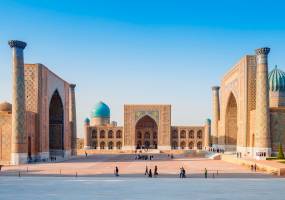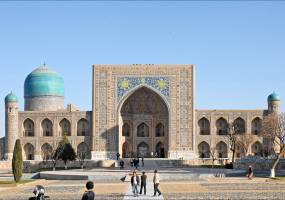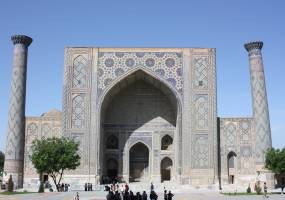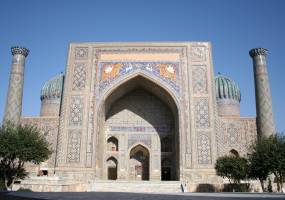...People sometimes described what they read in the Burkhan-i- Kati.
“Samar built a “kent” (settlement) on this land and gathered some people. According to this the city of Samarkand was named Sa- mara-kent (settlement of Samara), and when the Arabs conquered the city they named it Samarkand. So now we use this name”.
However other people have read in another book The Masalik- ul-Mamolik that king Samar-Baqi came to the Samarkand “viloyat” (province) from Fergana and kingdom of Kashgar and was very angry with Samarkandians. He dug (“kand" means “to dig” in Persian) city walls that let Arabs occupy it and named it Samarkand.
But a mullah in my “kishlak” (village) told me what he had read in the Tarih-i-Tabari. (I must say, the book was written by a clever man). And thus it tells us “the city was founded by king Samar, and Kand is the name of a Turkic clan who came there and stayed. That is how the city got its name Samar- Kand, and then, once taken by the Islamic army it was named Samarkand.
However, in another “chakhona” (cafe) sat a man who liked to boast to trustful listeners that in the city outskirts there was a well dug by a man whose name was Samar. People then settled down around the well and that is why they named it Samarkand (dug by Samar). But you know my friends, nobody hasbeen able to find that well in all this time.
The silly mullah from my village had read only two books in his life, and one of them was Haft Iklim which tells of a man, Samar by name, from Yemen (from the Tubba tribe) who scaled the city walls and destroyed the whole place as the people of Samarkand did not want to follow the true religion of our prophet Mohammed: may his soul live in the halls of Allah! This is nonsense.
But I shall tell you the truth my dear friends, for these words were written in the secret books of my family’s tree. And you know that old men - grandfathers and grandfathers of our grandfathers - never lie. It happened thus:
Samarkand, in ancient times, was the headquarters of several “khakans” (khans) and governors.
It was founded by Key-Kavus, and became the capital of all Mavaru- al-Nahar. It was situated to the south of the Suguda (Zeravshan) river. There was an abundance of water, fruit trees and gardens in the city. The place was renowned for its quince, which was exported from there. The Samarkand wheat was also very cheap. Many scientists and noble people lived in Samarkand. In this place there was a fortified wall whose length was over 50,000 steps. But after many years the wall collapsed, people grew poor and lived in despondency.
A cheerful hero, called Kurshasf came to this city of melancholy and grief. That day there was a terrible earthquake and much of the city collapsed. In amongst the ruined walls Kurshasf found a large amount of treasure. With this he built new walls and restored the city to its former glory.
After that king Gushtasp, son of Lagrasp, did his best to further build and re-decorate the city. Then, Iskender ZulKarneyn (Iskander the Two-horned -Alexander the Great), founded a big city on the place of the broken fortress so that life could continue in this nice city. But when Tubba, the king of Yemen, heard about the beauty and luxuryof Samarkand he sent his general Samar bin Abu Karab bin Afrikus bin Abhar to conquer the city.
Samar’s victorious campaign proceeded to the borders of Turkistan. But, having approached Samarkand, Samar could not seize it, despite his best efforts. The siege lasted one year, but the men of Samarkand were brave heroes and they did not let their greedy enemies enter the city.
On one night, Samar, whilst watching his patrols, caught a Samarkandian and said to him:
“If you want to survive, you must answer my question: Who is the king of your city? I have been frying to conquer Samarkand for more then a year, but his wisdom and courage does not allow me to succeed."
“You should know that. Our king has no sons. He is a fool himself. Не is interested in nothing but food. He is drunk day and night. But he has a daughter who heads the army and defends the walls.”
Then Samar bin Karab realized what he must do. The general was very sly and concocted a plan that even sorcerers would envy.
The next day he sent the captive Samarkandian to the princess with a letter in which he informed that he had come not as an aggressorbut as a loving fiance. Не certainly understood that the princess would not believe his words, but that was his plan, and so Samar waited for her answer.
Sure enough her reply came back: “Your words are false and artful. If you spoke the truth you would not have had to storm our walls all this time. You should have sent your matchmakers to my father...”
Then Samar sent another letterwhich was a combination of flattery and obstinacy:
“Oh, young maiden! You are the most beautiful woman in the Universe! I am not interested in your city or your king. Khurasan and Adjam belong to me, and if you marry me I shall give your father all the local cities, the Arab empire, Persia and all lands up to China. I have brought thousands of chests filled with gold, jewels and clothes to confirm my words. I shall put these chests at the gates, and youwill see ту honesty.
Samar’s message was duly delivered to the princess and the next day the people of Samarkand saw Samar’s soldiers bring huge and heavy chests to each of the four gates of the city. By nightfall there were a thousand chests at each gate.
The princess was surprised. She wanted to know what treasures that strange man had sent to her. She wanted to see the gifts early the next morning and ordered that the chests be carried into the city. Her soldiers did as she had said.
As soon as the chests were delivered, a donkey, standing beyond thewall sent a signal. Then the covers suddenly opened and three soldiers jumped out from each chest. They quickly slaughtered many of the city guards and opened the gates. Samar’s army was waiting for this cue and like a terrible wave they rushed through the gates and into the streets of the sleeping city, bringing death and fire wherever they went.
The aggressors killed and plundered the Samarkandians for three days and three nights. The princess died in the battle along with all her city folk. Only the small children escaped death but they were quickly were chained and made slaves.
The cunning Samar ordered the city to be razed, its treasures dug up and barley sown on the ruins. Since then the city has been called - “Samar dug”, that is: Samarkand. For many centuries there stood hills covered by barley and camel’s-thorn. It was only many years later that the brave Amir Timur came here. On the 12th of Ramazan 771 (according to the Islamic calendar) Timur Guragan became the governor of this province but his future capital had no walls and was protected from its enemies by only street barricades. Therefore Timur ordered the restoration of the city, and to this day we still live in it...
(Source: "Mysterious Asia")
For the city tour 195$
The price includes:
- Transportation costs
- Entrance tickets
- We will meet you at the hotel and take you back after the tour (or to the airport/railway station)
- The duration of the tour is approximately 4 astronomical hours, depending on the interest of the tourists
- We will be able to adjust the route according to your wishes
- We take into consideration all the wishes of customers



